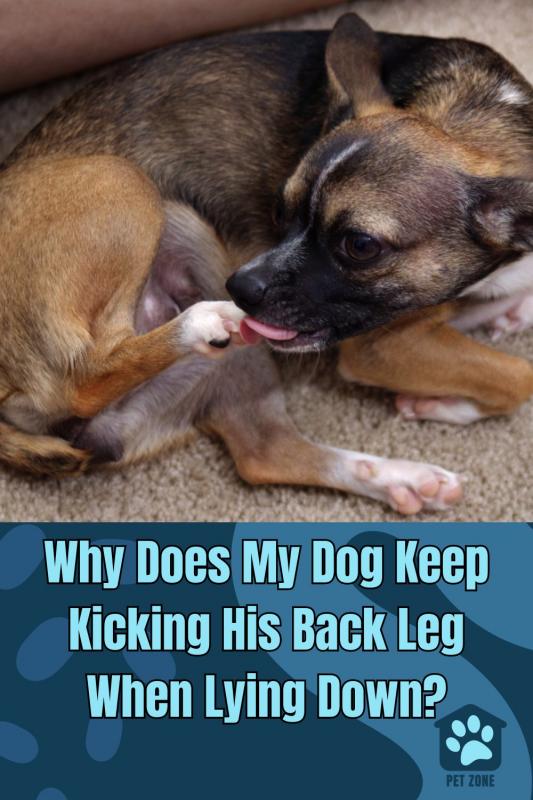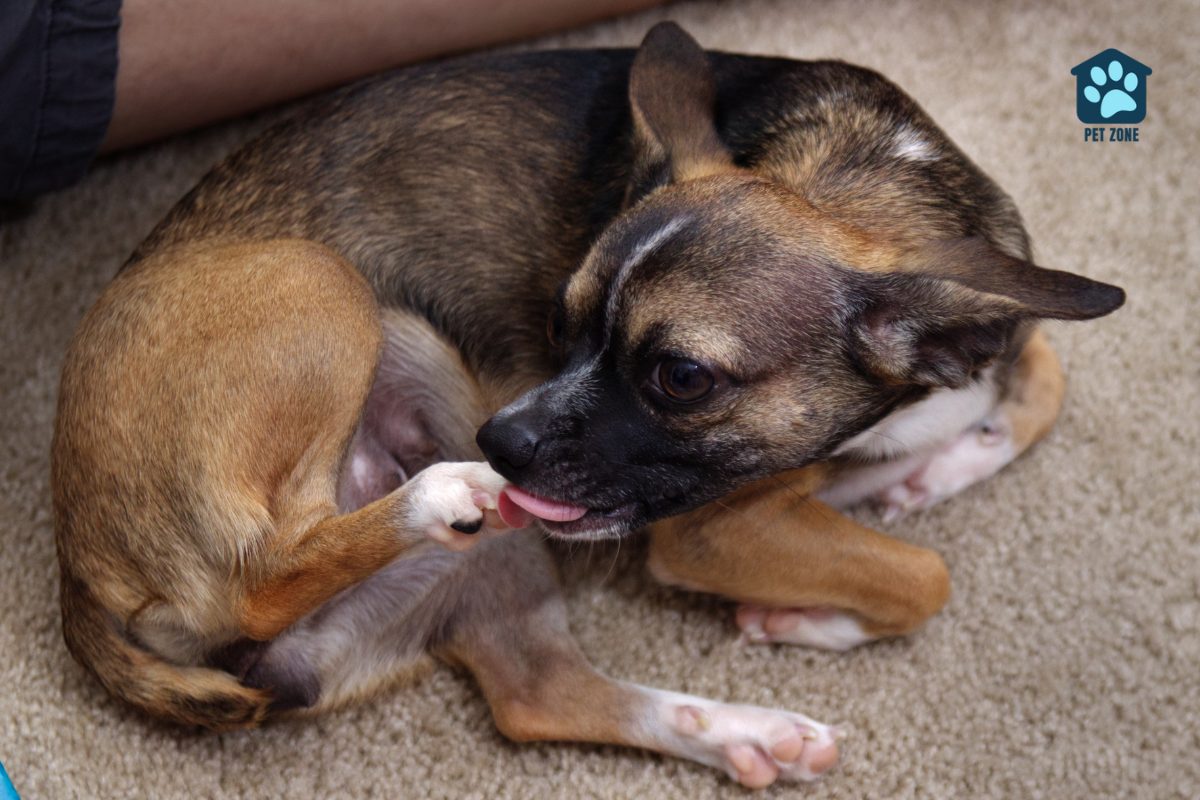Estimated reading time: 7 minutes
Have you ever noticed your dog kicking his back leg while lying down and wondered why? It’s actually quite common, and can be triggered by a variety of reasons from territorial marking to signs of neurological conditions.
This article will walk you through these various causes, helping you better understand your furry friend’s behavior. Let’s uncover the mystery behind those mysterious kicks!
Key Takeaways
- Involuntary spasms of the back legs in dogs when lying down happen for various reasons, including reflexive scratching, excitement, dominance display, territorial behavior, muscle spasms or cramps, and neurological conditions.
- Reflexive scratching is a natural action that dogs have to protect themselves from bugs like fleas and ticks. It’s an automatic response triggered by nerves in their spinal cord.
- Dogs may kick their back legs when excited or during active REM sleep cycles. This behavior is normal and nothing to worry about unless it becomes excessive.
- Kicking their leg can also be a way for dogs to show dominance or mark their territory. It’s part of how dogs communicate with each other without words.
- Muscle spasms or cramps can cause dogs to kick their back legs. While some twitching during sleep is normal, frequent spasms while awake could indicate an underlying issue and should be addressed by a veterinarian.
- Neurological conditions such as arthritis, degenerative myelopathy or lumbosacral stenosis can also cause dogs to kick their back legs frequently. Consulting a veterinarian is important for proper diagnosis and treatment.
- To manage kicking behavior, provide your dog with a comfortable and secure space where they can relax without feeling the need to kick. Regular exercise and stretching can help prevent muscle spasms that trigger kicking behavior.
Reasons Why Your Dog May be Kicking Back Legs When Lying Down
There are several reasons why your dog may kick his back leg when lying down, including reflexive scratching, excitement, dominance display, territorial behavior, muscle spasms or cramps, and neurological conditions.

Reflexive scratching
Dogs have a built-in action known as reflexive scratching. It’s how they shield themselves from bugs like fleas and ticks. Nerves that connect to their spinal cord cause this kick and scratch move.
Your dog isn’t doing it on purpose; it’s an automatic response! If a certain spot gets touched, the leg starts to kick out. But watch for too much scratching or kicking. It could mean there is an issue that needs care.
Feeling excited
Dogs show joy in many ways. One way could be by wagging their tail or kicking their back legs. Your dog may kick back when he gets too happy. He might do it while playing with you or another dog. It is normal behavior and nothing to worry about.
You may notice your dog kicking his back legs while sleeping. This happens during active REM cycles, like humans have when dreaming. This can occur more frequently in older dogs as their sleep cycles change over time. If your dog’s leg jerks don’t seem to bother him, then it’s a good sign that he is well and just feeling excited!
Showing dominance
Dogs use many ways to show power. One way is a kick with the back leg when lying down. This act can tell another dog who is boss. Dogs of all ages and breeds do this. It’s part of how dogs talk to each other without words.
But if your dog kicks often, it may hurt him. He might get muscle spasms or even lose the use of his legs. If you see your dog kicking a lot, take him to a vet for help right away.
Territorial behavior
Dogs have a natural instinct to mark their territory and show dominance. One way they do this is by kicking their back legs when lying down. This behavior helps them spread their scent and communicate with other dogs in the area.
When your dog kicks his back leg, he’s saying, “This is my space, and I’m in charge.” It’s a normal part of their territorial behavior. So if you notice your dog doing this, there’s no cause for concern – it’s just his way of claiming his territory.
Muscle spasms or cramps
Muscle spasms or cramps in dogs can cause them to kick their hind legs when lying down. These spasms may be caused by overexertion, neurological damage, or physical injury. Weak leg muscles or imbalances in chemicals or nerves can also lead to leg tremors.
It’s important to note that twitching in a dog’s back legs during sleep is normal and may be a result of active dreaming.
However, if your dog experiences frequent muscle spasms or cramps while awake, it could be a sign of a serious underlying issue and should be addressed by a veterinarian.
Neurological conditions
Neurological conditions can cause dogs to kick their back legs when lying down. One example is degenerative myelopathy, which affects the nerves in the lower spine and can lead to weakness, gradual paralysis of the hind legs, and incontinence.
Dogs may also kick their back legs due to electrolyte imbalances, toxin ingestion, orthopedic issues, or neuromuscular problems. Another condition called lumbosacral stenosis can cause a progressive loss of hind leg function due to pressure on the spine from narrowing in the last spinal joint.
If you notice your dog kicking their back legs frequently or experiencing any other unusual symptoms, it’s important to consult a veterinarian for proper diagnosis and treatment.
Tips for Managing Your Dog’s Kicking Behavior
To manage your dog’s kicking behavior, provide them with a comfortable and secure space where they can relax without feeling the need to kick their back leg.
Regular exercise and stretching can also help prevent muscle spasms that may trigger the kicking behavior.
If the kicking persists or causes concern, consult a veterinarian for proper diagnosis and treatment.
Providing a comfortable and secure space
Make sure to give your dog a cozy and safe area where they can relax. This can help manage their kicking behavior. Have a soft bed or blanket for them to lie on, as it provides comfort and support for their muscles and joints.
Additionally, create a quiet space away from distractions where they feel secure. Dogs thrive in environments that promote relaxation, so providing them with this type of space can help reduce any anxiety or restlessness that may be causing the kicking behavior.
Remember, proper animal handling is crucial when dealing with dogs, so make sure to approach them gently and avoid any sudden movements that could startle or agitate them further.
Regular exercise and stretching
Regular exercise and stretching are important for managing your dog’s kicking behavior when lying down. Here’s what you can do:
- Take your dog for daily walks or play fetch to keep them active.
- Engage in interactive games such as hide-and-seek or agility training to provide mental stimulation and physical exercise.
- Incorporate stretches into your dog’s routine, focusing on their back legs and hips.
- Consult with a veterinarian or a professional dog trainer to get guidance on suitable exercises and stretches for your dog’s specific needs.
- Gradually increase the intensity and duration of exercise sessions over time, while always considering your dog’s age, breed, and overall health.
- Monitor your dog’s hydration levels during exercise, ensuring they have access to fresh water before, during, and after physical activity.
Consulting a veterinary professional for proper diagnosis and treatment
It is important to consult a vet for proper diagnosis and treatment of your dog’s kicking behavior. Here are some reasons why:
- Veterinarians have the knowledge and expertise to identify the underlying cause of your dog’s kicking behavior.
- They can perform thorough examinations, including physical exams and possibly tests such as x-rays or blood work, to rule out any medical conditions or injuries.
- Veterinary professionals can provide you with advice on managing your dog’s behavior and offer solutions tailored to your specific situation.
- They can prescribe medication or recommend treatments to alleviate any pain or discomfort your dog may be experiencing.
- Consulting a veterinarian ensures that you are taking the necessary steps to address any potential health issues and improve your dog’s well-being.

Conclusion
There are many reasons why your dog may kick his back leg when lying down. It could be reflexive scratching, excitement, dominance behavior, or even muscle spasms.
In some cases, it may be a sign of neurological conditions. To manage this behavior, provide a comfortable space for your dog and consult a veterinarian for proper diagnosis and treatment if necessary.
As an Amazon Associate I earn from qualifying purchases.










It’s amazing how much you can learn from dogs just by observing their behaviors I enjoy reading your blog and learning what my dog’s peculiarities mean.
I am passing this on to a friend of mine who has a dog. I wish I had articles like this when I had a pet. They are so very helpful and informative.